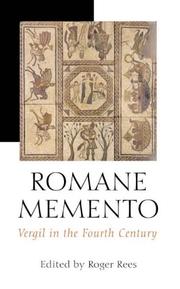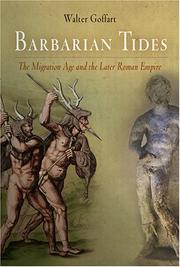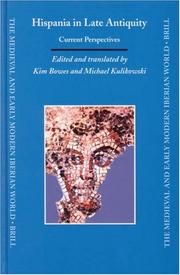| Listing 1 - 10 of 12 | << page >> |
Sort by
|

ISBN: 0715632426 Year: 2004 Publisher: London Duckworth
Abstract | Keywords | Export | Availability | Bookmark
 Loading...
Loading...Choose an application
- Reference Manager
- EndNote
- RefWorks (Direct export to RefWorks)
Book
Year: 1953 Publisher: Bremen-Horn : Dorn,
Abstract | Keywords | Export | Availability | Bookmark
 Loading...
Loading...Choose an application
- Reference Manager
- EndNote
- RefWorks (Direct export to RefWorks)
Late oudheid. --- Opgravingen. --- Vor- und Frühgeschichte. --- Vroege middeleeuwen. --- Mahndorf (Germany).
Book
Year: 1952 Publisher: Mainz : Verlag des Römisch-Germanischen Zentralmuseums,
Abstract | Keywords | Export | Availability | Bookmark
 Loading...
Loading...Choose an application
- Reference Manager
- EndNote
- RefWorks (Direct export to RefWorks)
Art antique. --- Art, Ancient. --- Art, Ancient. --- Elfenbeinschnitzerei. --- Ivoires. --- Ivoor. --- Ivories. --- Ivories. --- Late oudheid. --- Vroege middeleeuwen.
Periodical
ISSN: 12507334 Year: 1993 Publisher: Turnhout Brepols
Abstract | Keywords | Export | Availability | Bookmark
 Loading...
Loading...Choose an application
- Reference Manager
- EndNote
- RefWorks (Direct export to RefWorks)
Antiquities --- Archaeology --- History, Ancient --- Antiquités --- Archéologie --- Histoire ancienne --- Periodicals --- Périodiques --- Late oudheid. --- Antiquité tardive --- Arts and Humanities --- History --- Antiquités --- Archéologie --- Périodiques --- BREPOLS-E EJARCHE EJHISTO EPUB-ALPHA-A EPUB-PER-FT

ISBN: 0812239393 9780812239393 9780812221053 0812221052 9786613210760 1283210762 0812200284 Year: 2010 Volume: *65 Publisher: Philadelphia : University of Pennsylvania Press,
Abstract | Keywords | Export | Availability | Bookmark
 Loading...
Loading...Choose an application
- Reference Manager
- EndNote
- RefWorks (Direct export to RefWorks)
The Migration Age is still envisioned as an onrush of expansionary "Germans" pouring unwanted into the Roman Empire and subjecting it to pressures so great that its western parts collapsed under the weight. Further developing the themes set forth in his classic Barbarians and Romans, Walter Goffart dismantles this grand narrative, shaking the barbarians of late antiquity out of this "Germanic" setting and reimagining the role of foreigners in the Later Roman Empire.The Empire was not swamped by a migratory Germanic flood for the simple reason that there was no single ancient Germanic civilization to be transplanted onto ex-Roman soil. Since the sixteenth century, the belief that purposeful Germans existed in parallel with the Romans has been a fixed point in European history. Goffart uncovers the origins of this historical untruth and argues that any projection of a modern Germany out of an ancient one is illusory. Rather, the multiplicity of northern peoples once living on the edges of the Empire participated with the Romans in the larger stirrings of late antiquity. Most relevant among these was the long militarization that gripped late Roman society concurrently with its Christianization.If the fragmented foreign peoples with which the Empire dealt gave Rome an advantage in maintaining its ascendancy, the readiness to admit military talents of any social origin to positions of leadership opened the door of imperial service to immigrants from beyond its frontiers. Many barbarians were settled in the provinces without dislodging the Roman residents or destabilizing landownership; some were even incorporated into the ruling families of the Empire. The outcome of this process, Goffart argues, was a society headed by elites of soldiers and Christian clergy-one we have come to call medieval.
Grandes migrations --- Migrations de peuples --- Migrations of nations --- Nations [Migration of ] --- Volksverhuizingen --- Migrations of nations. --- Europe --- Rome --- History --- Histoire --- Nations, Migrations of --- Human beings --- Migrations --- 392-814 --- Germanic invasions, 3d-6th centuries --- Germanen. --- Late oudheid. --- Migrations de peuples. --- Volksverhuizing. --- Völkerwanderung. --- Germanic Invasions of Rome (3rd-6th centuries). --- 200-814. --- Europe. --- Rome (Empire). --- Romeinse rijk. --- Römisches Reich. --- Invasions germaniques --- Europe - History - 392-814 --- Rome - History - Germanic Invasions, 3rd-6th centuries --- Ancient Studies. --- History. --- Medieval and Renaissance Studies.

ISBN: 9789004143913 9004143912 9781429453097 1429453095 1280868112 9786610868117 9047407520 1433707209 9781433707209 9781280868115 6610868115 9789047407522 Year: 2005 Volume: 24 Publisher: Boston, Mass. Brill
Abstract | Keywords | Export | Availability | Bookmark
 Loading...
Loading...Choose an application
- Reference Manager
- EndNote
- RefWorks (Direct export to RefWorks)
This collection of essays on late Roman Hispania describes the relationships between the peninsula and the rest of the late antique world. Its contributors - archaeologists, historians, and historians of art - address both the historical evidence and the complex historiography of late antique Hispania.
Romans --- Church history --- HISTORY. --- Civilization. --- Romans. --- Romeinse oudheid. --- Late oudheid. --- Primitive and early church. --- Geschichte 1-700. --- To 711. --- Spain --- Spain. --- Spanien. --- History --- Civilization --- Church history. --- History. --- Romains --- Eglise --- Histoire --- Espagne --- Civilisation --- Histoire religieuse --- Spain - History - Roman period, 218 B.C.-414 A.D. --- Spain & Portugal --- Apostolic Church --- Christianity --- Church, Apostolic --- Early Christianity --- Early church --- Primitive and early church --- Primitive Christianity --- Fathers of the church --- Great Apostasy (Mormon doctrine)
Periodical
ISSN: 22959718 Year: 1993 Publisher: Paris : Brepols,
Abstract | Keywords | Export | Availability | Bookmark
 Loading...
Loading...Choose an application
- Reference Manager
- EndNote
- RefWorks (Direct export to RefWorks)
Antiquities --- History, Ancient --- Archaeology --- Late oudheid. --- Antiquité tardive --- Histoire ancienne --- Archéologie --- Antiquities. --- Archaeology. --- History, Ancient. --- Ancient history --- Ancient world history --- World history --- Archeology --- Anthropology --- Auxiliary sciences of history --- History --- Archaeological specimens --- Artefacts (Antiquities) --- Artifacts (Antiquities) --- Specimens, Archaeological --- Material culture --- Història antiga --- Arqueologia --- Antiguitats (Arqueologia) --- Antiguitats arqueològiques --- Monuments arqueològics --- Objectes antics --- Objectes arqueològics --- Peces arqueològiques --- Restes arqueològiques --- Restes antigues --- Tresors arqueològics --- Patrimomi cultural --- Ruïnes --- Antropologia --- Ciències auxiliars de la història --- Història --- Antiguitats --- Espècimens
Book
ISBN: 9782728308224 2728308225 Year: 2008 Volume: 405 Publisher: Rome Ecole française de Rome
Abstract | Keywords | Export | Availability | Bookmark
 Loading...
Loading...Choose an application
- Reference Manager
- EndNote
- RefWorks (Direct export to RefWorks)
Les textes de l’Antiquité tardive ont été pour la plupart transmis par des collections médiévales. Ces recueils n’étaient pas de simples réceptacles. Leur organisation induisait des rapprochements, des redécoupages et des réécritures qui eurent une influence déterminante sur la transmission et la réception des documents qu’ils contenaient. La mise en recueil répondait en effet aux besoins et attentes d’un lectorat qui développait ou modifiait les ensembles véhiculés, constituant ainsi de nouveaux réseaux textuels. Les Actes des journées d’étude sur les collections latines et grecques explorent différents types de collections médiévales en fonction de critères génériques, linguistiques et culturels. Ils s’efforcent d’évaluer leur rôle dans la transmission de la culture antique entre le VIe et le XIVe siècle. Ils mettent en évidence le poids de ces recueils dans la perception de l’Antiquité tardive, dans les stratégies de réappropriation du passé et dans la façon dont les lecteurs médiévaux ont forgé leur propre culture. Ils montrent ainsi que l’histoire des collections est un champ essentiel de l’Histoire médiévale.
Transmission of texts --- Classical literature --- Latin literature, Medieval and modern --- Transmission de textes --- Littérature ancienne --- Littérature latine médiévale et moderne --- History --- Congresses. --- Congresses --- Classical influences --- Histoire --- Congrès --- Influence ancienne --- History and criticism --- Late oudheid. --- Bibliotheekcollecties. --- Latijn. --- Grieks. --- Rezeption. --- Spätantike. --- Literatur. --- History and criticism. --- Rom <2006> --- Rom <2006>. --- Littérature ancienne --- Littérature latine médiévale et moderne --- Congrès --- Literary transmission --- Manuscript transmission --- Textual transmission --- Criticism, Textual --- Editions --- Manuscripts --- Transmission of texts - History - To 1500 - Congresses --- Classical literature - History and criticism --- Latin literature, Medieval and modern - History and criticism --- Littérature médiévale --- Littérature antique --- Influence antique --- Appréciation --- Moyen âge
Book
ISBN: 9780199768998 0199768994 9780190201746 0190201746 1322182167 Year: 2015 Volume: *7 Publisher: Oxford : Oxford University Press,
Abstract | Keywords | Export | Availability | Bookmark
 Loading...
Loading...Choose an application
- Reference Manager
- EndNote
- RefWorks (Direct export to RefWorks)
This volume aims to reappraise the wide-ranging and lasting transformation of the Roman monarchy between the Principate and Late Antiquity. The book takes as its focus the period from Diocletian to Theodosius I (284-395) and thus on a major developmental phase in the history of the Roman Empire. During this period, the stability of monarchical rule depended heavily on the emperor's mobility, on collegial or dynastic rule, and on the military resolution of internal political crises.
Monarchy --- Emperors --- Christianity and politics --- Social change --- Monarchie --- Empereurs --- Christianisme et politique --- Changement social --- History. --- Histoire --- Rome --- History --- Kings and rulers. --- Politics and government --- Religion. --- Rois et souverains --- Politique et gouvernement --- Religion --- Kings and rulers --- Christianity and politics. --- Emperors. --- Monarchy. --- Political science. --- Social change. --- Monarchie. --- Late oudheid. --- 284-476. --- Rome (Empire). --- Czars (Emperors) --- Rulers --- Sovereigns --- Tsars --- Tzars --- Kingdom (Monarchy) --- Executive power --- Political science --- Royalists --- Europe --- Monarchy - Rome - History --- Emperors - Rome - History --- Christianity and politics - Rome - History --- Social change - Rome - History --- Rome - History - Empire, 284-476 --- Rome - Kings and rulers --- Rome - Politics and government - 284-476 --- Rome - Religion
Book
ISSN: 18621112 ISBN: 9783110301977 3110301970 1299723543 3110303183 9783110303186 Year: 2013 Volume: Bd. 111 Publisher: Berlin De Gruyter
Abstract | Keywords | Export | Availability | Bookmark
 Loading...
Loading...Choose an application
- Reference Manager
- EndNote
- RefWorks (Direct export to RefWorks)
Antike Bildungskonzepte werden in jüngerer Zeit intensiv erforscht. Dieser Band lenkt den Blick auf die Spätantike und den lateinischen Westen des Römischen Reiches. In den Saturnalia wendet sich Macrobius an seinen Sohn, um ihm Wissenswertes zu vermitteln. Untersucht wird, um welche Informationen es sich dabei handelt und wofür sie nützlich sind. Dazu werden auch der Entstehungskontext und die literarische Form der Saturnalia bestimmt und gedeutet. Aus den Briefen des Sidonius Apollinaris lässt sich ebenfalls ein Konzept von Bildung ableiten. Zwar lassen sich weniger konkrete Bildungsinhalte erschließen, dafür bieten die Briefe wertvolle Einblicke in das Verständnis und die Wertschätzung von Bildung im Gallien des 5. Jahrhunderts. Martianus Capellas De nuptiis Philologiae et Mercurii gilt als erste Enzyklopädie. Das Werk ist aufgrund seines Entstehungskontextes und seiner außergewöhnlichen literarischen Form von besonderem Interesse für die Untersuchung. Ausgehend von der Interpretation dieser drei Autoren wird ein Konzept der Bildungsvorstellungen im 5. Jh. n. Chr. entworfen, das Inhalte und Traditionen gleichermaßen aufgreift und Träger von Bildung sowie deren Einstellungen gegenüber Bildung aufzeigt.
Late oudheid. --- Vorming. --- Macrobius, --- Martianus Capella, --- Sidonius Apollinaris, C. Sollius Modestus, --- Latin literature --- Education in literature --- Education, Ancient --- Languages & Literatures --- Greek & Latin Languages & Literatures --- History and criticism --- Education in literature. --- Education --- Schools in literature --- History and criticism. --- History --- Macrobius, Ambrosius Aurelius Theodosius --- Martianus Capella --- Sidonius Apollinaris, --- Apollinaire, Sidoine, --- Apollinare, Sidonio, --- Apollinarīĭ Sidonīĭ, K. S., --- Apollinaris Sidonius, Caius Sollius, --- Gaius Sollius Apollinaris Sidonius, --- Gayo Solio Modesto Apolinar Sidonio, --- Sidoine Apollinaire, --- Sidoni Apol·linar, --- Sidonīĭ, K. S. Apollinarīĭ, --- Sidonio Apolinar, --- Sidonio Apollinare, --- Capella, Martianus --- Martianus Mineus Felix Capella Afer Carthaginensis --- Marziano Capella --- Macrobe --- Criticism and interpretation. --- Macrobio --- Macrobio, Ambrogio Teodosio --- Macrobius, Aur. Theodosius --- Macrobius, Aurelius Theodosius --- Macrobius Theodosius, Ambrosius --- Theodosius, Ambrosius Macrobius --- Marciano Mineo Félix Capela --- Capela, Marciano Mineo Félix --- Sidonius Apollinaris --- Late antiquity. --- Macrobius. --- Martianus Capella. --- Sidonius Apollinaris. --- learning.
| Listing 1 - 10 of 12 | << page >> |
Sort by
|

 Search
Search Feedback
Feedback About UniCat
About UniCat  Help
Help News
News